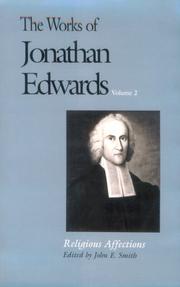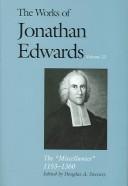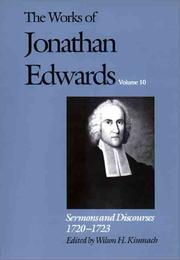| Listing 1 - 10 of 17 | << page >> |
Sort by
|
Book
ISBN: 2220023389 9782220023380 Year: 1981 Publisher: Paris: Desclée De Brouwer,
Abstract | Keywords | Export | Availability | Bookmark
 Loading...
Loading...Choose an application
- Reference Manager
- EndNote
- RefWorks (Direct export to RefWorks)
248*33 --- Anglicaanse spiritualiteit --- 248*33 Anglicaanse spiritualiteit
Book
ISBN: 2745313495 9782745313492 Year: 2006 Volume: 106
Abstract | Keywords | Export | Availability | Bookmark
 Loading...
Loading...Choose an application
- Reference Manager
- EndNote
- RefWorks (Direct export to RefWorks)
248*33 --- Anglicaanse spiritualiteit --- 248*33 Anglicaanse spiritualiteit --- Spirituality --- Church of England --- Catharine Parr --- Religion
Book
ISBN: 0300011989 9780300011982 Year: 1970 Volume: 3 Publisher: New Haven: Yale university press,
Abstract | Keywords | Export | Availability | Bookmark
 Loading...
Loading...Choose an application
- Reference Manager
- EndNote
- RefWorks (Direct export to RefWorks)
248*33 --- Sin, Original --- Depravity --- Original sin --- Fall of man --- Anglicaanse spiritualiteit --- 248*33 Anglicaanse spiritualiteit

ISBN: 0300009666 9780300009668 Year: 1959 Publisher: New Haven: Yale university press,
Abstract | Keywords | Export | Availability | Bookmark
 Loading...
Loading...Choose an application
- Reference Manager
- EndNote
- RefWorks (Direct export to RefWorks)
This volume contains Edwards’ most mature and persistent attempt to judge the validity of the religious development in eighteenth-century America known as the Great Awakening. In developing criteria for such judgment he attacked at the same time one of the fundamental questions facing all religion: how to distinguish genuine from spurious piety? The Awakening created much bitter controversy; on the one side stood the emotionalists and enthusiasts, and on the other the rationalists, for whom religion was essentially a matter of morality or good conduct and the acceptance of properly formulated doctrine. Edwards, with great analytical skill and enormous biblical learning, showed that both sides were in the wrong. He attacked both a “lifeless morality” as too pale as to be the essence of religion, and he rejected the excesses of a purely emotional religion more concerned for sensational effects than for the inner transformation of the self, which was, for him, the center of genuine Christianity.
248*33 --- 248*33 Anglicaanse spiritualiteit --- Anglicaanse spiritualiteit --- Emotions - Early works to 1850 --- Emotions

ISBN: 0300014376 9780300014372 Year: 1972 Volume: 4 Publisher: New Haven: Yale university press,
Abstract | Keywords | Export | Availability | Bookmark
 Loading...
Loading...Choose an application
- Reference Manager
- EndNote
- RefWorks (Direct export to RefWorks)
248*33 --- Great Awakening --- Awakening, Great --- Religious awakening --- Evangelical Revival --- Anglicaanse spiritualiteit --- Christianity --- 248*33 Anglicaanse spiritualiteit

ISBN: 0300041551 9780300041552 Year: 1989 Volume: 9 Publisher: New Haven: Yale university press,
Abstract | Keywords | Export | Availability | Bookmark
 Loading...
Loading...Choose an application
- Reference Manager
- EndNote
- RefWorks (Direct export to RefWorks)
In 1739 Jonathan Edwards preached a series of thirty sermons in his church at Northampton, Massachusetts—sermons based on one scriptural passage, Isaiah 51:8. Apparently Edwards later intended to develop this discourse into a major treatise construing God’s redemption of the world as the most basic doctrine of theology. Unfortunately, he died before he could undertake this project. The sermon series, however, was later transcribed and then published in Edinburgh in 1774. There were numerous editions in Britain and the United States, and it was enormously influential in popular evangelical circles of the nineteenth century. This edition presents a modern, authoritative text that firmly establishes the place of Work of Redemption in the literary and historical tradition of puritan New England.The text is based upon a new transcription of the original preaching booklets in which Edwards wrote out his sermons. In this sense, it restores an earlier and more authentic, if less polished, version of the work than the one that was edited and issued after Edwards’ death. As a critical edition it presents Edwards’ Redemption Discourse for the modern reader with appropriate annotations and references.This volume includes a substantial introduction that places the composition of the sermons in the context of the period and discusses the reception and influence of the many editions of the published version. The introduction also interprets the place of this particular work in Edwards’ thought more generally, de-emphasizing the historical interests he has been alleged to have shown in it and emphasizing instead the ambitious theological program which it represented. Accordingly, this volume presents this major treatise in a fresh light and suggests new lines of inter-connection with other elements of his work.
Redemption --- 248*33 --- 248*33 Anglicaanse spiritualiteit --- Anglicaanse spiritualiteit --- Religion --- Early works to 1800 --- Redemption - Early works to 1800.
Book
ISBN: 0571098460 9780571098460 Year: 1972 Publisher: London: Faber and Faber,
Abstract | Keywords | Export | Availability | Bookmark
 Loading...
Loading...Choose an application
- Reference Manager
- EndNote
- RefWorks (Direct export to RefWorks)

ISBN: 0300022824 9780300022827 Year: 1980 Volume: 6 Publisher: New Haven: Yale university press,
Abstract | Keywords | Export | Availability | Bookmark
 Loading...
Loading...Choose an application
- Reference Manager
- EndNote
- RefWorks (Direct export to RefWorks)
This volume contains two major manuscript notebooks of Jonathan Edwards—"Natural Philosophy" and "The Mind"—as well as a number of shorter manuscript writings connected with his scientific interests and philosophical development. Several of the shorter papers have not previously been published, notably Edwards’ letter on the "flying" spider (hither known only in a draft version), an essay on light rays, and a brief but important set of philosophical notes written near the end of his life. Wherever possible the works have been newly transcribed from manuscript originals. Wallace Anderson has collected, edited, and presented them here in a thoroughly authentic and readable text.Each of the major works in this volume and each group of related writings are preceded by detailed discussion of manuscript sources and dates. In his introduction Anderson makes these the basis for a revised account of the chronology of Edwards’ early writings and a deeper investigation of their biographical and historical context. Also included in the introduction are a new appraisal of Edwards’ efforts and achievements in science and an analysis of the developmental of his philosophical views. Anderson concludes from his research that Edwards was an enthusiastic, though untrained, investigator in the Newtonian tradition and that he grappled with the major metaphysical problems raised by this tradition. The papers reveal with special clarity the fertile and inquiring mind of our leading eighteenth-century philosopher-theologian.
Philosophy --- Science --- 248*33 --- 248*33 Anglicaanse spiritualiteit --- Anglicaanse spiritualiteit --- Natural science --- Natural sciences --- Science of science --- Sciences --- Mental philosophy --- Humanities --- Philosophy. --- Science.

ISBN: 0300051360 9780300051360 Year: 1992 Volume: 10 Publisher: New Haven: Yale university press,
Abstract | Keywords | Export | Availability | Bookmark
 Loading...
Loading...Choose an application
- Reference Manager
- EndNote
- RefWorks (Direct export to RefWorks)
This volume presents the complete texts of twenty-three sermons preached by Jonathan Edwards during the first years of his career. The sermons, which have never been printed before, document one of the least explored periods of this eminent theologian's life and thought. Fully annotated, they are accompanied by an editor's preface that combines new information with fresh readings of related texts, such as the "Diary" and "Personal Narrative."The volume includes a general introduction that puts Edwards's thirty-five years of writing and preaching into a broad literary and historical context. Based on the study of his entire sermon corpus—including over seventy printed sermons and twelve hundred sermon manuscripts—as well as related notebooks, letters, and treatises, the introduction enables readers to understand the elaborate network of working papers through which Edwards evolved his thought, as well as the critical function of the sermon in testing and developing expression of that thought. The introduction also explores the literary context of Edwards's writing, especially relating to the theory and practice of homiletics.
Congregational churches --- Preaching --- Sermons, American --- 248*33 --- 248*33 Anglicaanse spiritualiteit --- Anglicaanse spiritualiteit --- Sermons, English --- Christian preaching --- Homiletics --- Speaking --- Pastoral theology --- Public speaking --- Sermons --- History --- Religious aspects --- Sermons, American. --- Sermons. --- Congregational churches - Sermons. --- Preaching - United States - History - 18th century.

ISBN: 0300040202 9780300040203 Year: 1989 Volume: 8 Publisher: New Haven: Yale university press,
Abstract | Keywords | Export | Availability | Bookmark
 Loading...
Loading...Choose an application
- Reference Manager
- EndNote
- RefWorks (Direct export to RefWorks)
This volume contains two major works of Jonathan Edwards: an unpublished text of a series of sermons he preached in 1738, known as Charity and Its Fruits, and his Two Dissertations: I. Concerning the End for Which God Created the World and II. On the Nature of True Virtue, published posthumously in 1765. Together these writings set out the principles of Edwards’ ethical reflections.The text of the sermon series is drawn from three sources. The primary text is an early nineteenth-century transcription of Edwards’ sermon booklets now in the Andover-Newton Theological School’s collection. Passages published in Tyron Edwards’ 1852 edition, and partial transcriptions by Joseph Bellamy found in three fragments among his papers, have been used where the Andover copy is incomplete. The Bellamy fragments are reproduced in their entirety in a critical appendix, along with examples showing the editor’s use of the three sources in construing this definitive text for the Yale edition.End of Creation and True Virtue, intended by Edwards to be read together, are shown here to be closely related to Edwards’ other writings. Paul Ramsey’s introduction points out that Edwards returned again and again to these topics in his Miscellanies, where he identifies penultimate versions of both treatises and traces the development of Edwards’ ideas. Thus the reader is able to follow Edwards’ most profound reflections about God and the moral dimensions of his creations. This is one of the most wide-ranging theological and philosophical volumes projected in the Yale edition. The Editor’s Introduction gives a systematic analysis of the theological ethics to be found in these writings and of Edwards’ esteem for the splendor of common morality. Appendices exploring the “moral sense” school, “infused” virtue in Edwards and Calvin, and Edwards’ belief in the never ending increase of holiness and happiness in heaven complete the volume."The Jonathan Edwards Project is the first of its kind—a comprehensive, exhaustive effort to produce an online archive of all of Edwards' sermons, treatises, letters and musings to serve the needs of anyone who cares to know the man. To date, no other university or institute has attempted to transcribe, computerize and then post online the complete works of any one historical figure. . . . Though he may never attain the rock-star status of George Washington, with the Yale project, Edwards will live forever.
Christian ethics --- 248*33 --- 248*33 Anglicaanse spiritualiteit --- Anglicaanse spiritualiteit --- Ethical theology --- Moral theology --- Theology, Ethical --- Theology, Moral --- Christian life --- Christian philosophy --- Religious ethics --- Congregational authors --- Christian ethics - Congregational authors - Early works to 1800.
| Listing 1 - 10 of 17 | << page >> |
Sort by
|

 Search
Search Feedback
Feedback About UniCat
About UniCat  Help
Help News
News